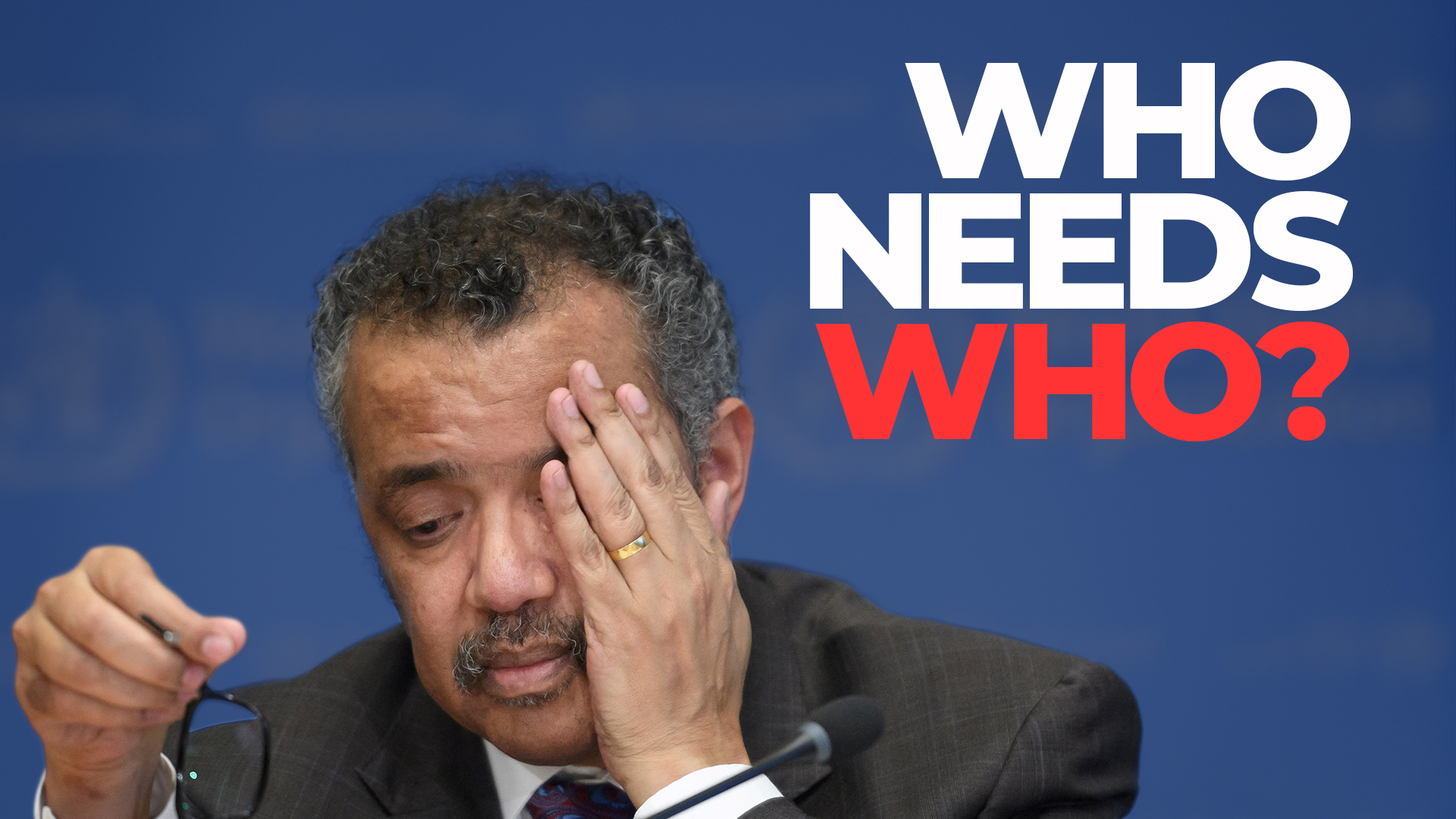
Gwen Baumgardner: SINCE THE START OF THE PANDEMIC, THE UNITED STATES HAS BEEN PUBLICLY AT ODDS WITH THE WORLD HEALTH ORGANIZATION.
FIRST, THREATENING TO WITHDRAW MEMBERSHIP AND FUNDING.
Donald Trump: “We will today be terminating our relationship with the World Health Organization.”
Baumgardner: THEN, clashing OVER TRAVEL BANS, VACCINE INEQUALITY, AND THE WHO’S INVESTIGATION OF THE WUHAN LAB.
Reporter / Jen Psaki: “It’s not sufficient” “We agree. It lacks crucial data, information.”
Baumgardner: DESPITE ALL THAT – THE UNITED STATES REMAINS THE ORGANIZATION’S LARGEST DONOR.
BUT DOES THAT STILL MAKE SENSE? DO WE NEED THE WHO?
LET’S GET THIS STRAIGHT.
THE WORLD HEALTH ORGANIZATION IS A UN AGENCY THAT REPRESENTS 192 COUNTRIES, WITH A MISSION TO ‘give everyone, everywhere an equal chance to live a healthy life’.
IT’S A PRETTY LOFTY GOAL…NOT EVERYONE BUYS INTO.
Dr. Kelley Lee: “This is the dilemma that WHO has… You can read it as global health diplomacy in action, or you can see it as kind of a toothless organization that isn’t able to get its member states to act accordingly.”
Baumgardner: THAT’S GLOBAL HEALTH EXPERT DR. KELLEY LEE, WHO’S COLLABORATED AND CONSULTED FOR THE WORLD HEALTH ORGANIZATION OVER THE PAST 30 YEARS.
SHE CALLS THE PANDEMIC RESPONSE ‘CHAOTIC’, BUT EMPHASIZES IT’S ONLY ONE FACET OF THE ORGANIZATION.
THE WHO HAS DONE A LOT OF GOOD DURING ITS 73 YEAR HISTORY…FROM THE DEVELOPMENT OF AN EBOLA VACCINE TO SMALLPOX ERADICATION, TO the NEAR ERADICATION OF POLIO.
ON A DAY-TO-DAY BASIS- THE ORGANIZATION DOES WHAT COUNTRIES WOULD STRUGGLE TO DO INDEPENDENTLY: CREATING UNIVERSAL NAMEs FOR DISEASES, TRACKING HEALTH TRENDS, BUILDING A GLOBAL DATABASE, AND COORDINATING INTERNATIONAL HEALTHCARE EFFORTS.
IT’S A HEAVY LIFT WITH SOME SERIOUS LIMITATIONS.
THE FIRST IS ENFORCEMENT. THE WHO has DIPLOMACY, but NO LEGAL AUTHORITY.
WE’VE SEEN THIS THROUGHOUT THE PANDEMIC. LIKE THEIR CONDEMNATION OF TRAVEL BANS… THAT AMERICA ENFORCED ANYWAY.
OR THEIR PERCEIVED LENIENCY TOWARD CHINA…WHOSE TRANSPARENCY ABOUT COVID NUMBERS AND PANDEMIC’S ORIGIN IS MURKY AT BEST.
Dr. Lee: “WHO can ask and ask again. But it cannot, you know, walk into a country and demand and slam its fist on the table or just call out their government for not doing that. There’s no enforcement mechanism. There’s no kind of committee that it can punish a government for not complying.”
Baumgardner: ANOTHER ISSUE IS FUNDING. THE ORGANIZATION RELIES HEAVILY ON DONATIONS. AND DESPITE SERVING THE WORLD, THEIR BUDGET IS ROUGHLY A THIRD OF THE CDC’S.
WHICH BEGS THE QUESTION…WHY HAVE THE WHO IF AMERICA HAS ITS OWN PUBLIC HEALTH AGENCY?
Dr. Lee: “The CDC is probably the most, one of the most established public health organizations. But unfortunately, not every country has a CDC. So we do need to, you know, create an organization that kind of serves that purpose for other countries that have less capacity.”
Baumgardner: AKA- IT’S NOT ALL ABOUT US. AND WITHOUT A GLOBAL ORGANIZATION…THE INEQUALITIES BETWEEN RICH AND POOR NATIONS WOULD BE EVEN MORE STARK.
AND IF A WORLDWIDE PANDEMIC HAS TAUGHT US ANYTHING, IT’S THAT DISEASES KNOW NO BORDERS – AND WHAT HAPPENS AROUND THE WORLD HAS A DIRECT IMPACT RIGHT HERE (point) IN THE US.
HOWEVER ‘CHAOTIC’ SOME BELIEVE THE PANDEMIC RESPONSE HAS BEEN, WITHOUT A WORLD HEALTH ORGANIZATION…TRACKING COVID TRENDS AND FACILITATING A GLOBAL VACCINE ROLLOUT WOULD’VE BEEN EVEN MORE DIFFICULT.
SO, DO WE NEED THE WHO? DR. LEE SAYS YES, BUT WITH A CAVEAT.
Dr. Lee: “We need to kind of maybe rename it a Global Health Organization, have a fresh start, give it more resources, give it more authority and just realize the world is much more integrated than it was after the Second World War. Going back to your first question when Yes, we still needed WHO, but I don’t know if we need the organization as it is now.
Baumgardner: DO YOU AGREE?
LET ME KNOW YOUR THOUGHTS IN THE COMMENTS BELOW.
AND BE SURE TO RATE THIS STORY ON THE STRAIGHT ARROW BIAS METER.









